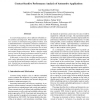Free Online Productivity Tools
i2Speak
i2Symbol
i2OCR
iTex2Img
iWeb2Print
iWeb2Shot
i2Type
iPdf2Split
iPdf2Merge
i2Bopomofo
i2Arabic
i2Style
i2Image
i2PDF
iLatex2Rtf
Sci2ools
111
click to vote
DATE
2005
IEEE
2005
IEEE
Context Sensitive Performance Analysis of Automotive Applications
Accurate timing analysis is key to efficient embedded system synthesis and integration. While industrial control software systems are developed using graphical models, such as Matlab/Simulink or ASCET/SD, exhaustive simulation is not suitable for verifying functional and timing behavior. Formal performance analysis is an alternative but can lead to wide timing intervals because of input data dependency and complex target architectures. Hence a designer might want to restrict the formal performance analysis to parts of the software system, called context or process modes. In this paper, we describe how to define and characterize such context information from graphical models. Further, we extend the formal performance analysis to consider contexts. Results from an automotive application demonstrate the applicability of our approach.
Related Content
| Added | 24 Jun 2010 |
| Updated | 24 Jun 2010 |
| Type | Conference |
| Year | 2005 |
| Where | DATE |
| Authors | Jan Staschulat, Rolf Ernst, Andreas Schulze, Fabian Wolf |
Comments (0)

